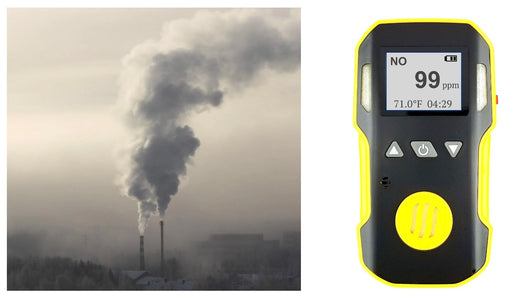Nitric oxide (NO), a poisonous, non-flammable oxidizing gas with a sweet, pungent odor, is a by-product of chemical combustion in fossil fuel plants and can be released during metal etching processes involving nitric acid. Nitric oxide gas detectors are crucial for ensuring that people and the environment are not exposed to unsafe levels of nitric oxide. Nitric oxide detectors are essential tools for maintaining safe NO gas concentrations in various industrial settings. These detectors continuously monitor the atmosphere, alerting personnel when NO levels exceed established thresholds. By implementing nitric oxide gas detection, companies can protect their employees and the surrounding environment from the harmful effects of NO exposure, promoting a safer and healthier workplace.
Pros |
Cons |
|
✅ A Nitric oxide detector can be useful in preventing harm to both humans and the environment from excessive nitric oxide gas exposure ✅ Nitric oxide detectors can last for 2-3 years before needing replacement ✅ Nitric oxide gas detectors are small, have fast response and can be purchase for less than $400 |
⛔ Nitric oxide gas is toxic to humans ⛔ OSHA TWA recommended levels is 25ppm over 8 hours ⛔ Nitric oxide detectors require bump testing and 6-12 months gas calibration ⛔ Sometimes confused with NOx, NO2, N2O ⛔ Nitric oxide is a unstable gas and is very reactive making it difficult to measure in a consistent and repetitive fashion |
What is the Best Nitric Oxide Detector?
Some reputable nitric oxide detectors include:
- Forensics Detectors' Nitric Oxide Detector
- TEquipment's Solo Nitric Oxide Detector
- ATO's Portable Nitric Oxide Detector
- Honeywell BW Single Gas Detector
- Draeger Single Portable Nitric Oxide Gas Detector
What is Nitric Oxide Gas?
- Nitric oxide gas has the chemical symbol NO.
- It is a poisonous, non-flammable oxidizing gas with a sweet, pungent odor.
- Nitric oxide is a by-product of the combustion of chemicals in fossil fuel plants and can be released by the action of nitric acid on metals, such as in metal etching.
- Cigarette smoke, motor engines, and power plants all contribute to this pollutant in the air.
- It is employed in the manufacture of nitric acid, as a breakdown agent in certain gaseous products, and in semiconductor fabrication. It is created by the oxidation of nitrogenous compounds.
- Because nitric oxide spontaneously converts to nitrogen dioxide in the air, some nitrogen dioxide is almost always present when nitric oxide is detected.
- Since nitric oxide gas is very reactive it may be tricky to detect and measure in a consistent fashion making its concentrations heavily dependent on temperature, humidity and other gases that are present.
- Nitrix oxide gas is sometimes confused with Nitrous oxide (N2O), a general anesthetic and greenhouse gas, and nitrogen dioxide (NO2), another air pollutant.

Is Nitric Oxide the same as Nitrogen Monoxide?
There are three names for NO gas. Nitric oxide, nitrogen oxide and nitrogen monoxide.
Is NO the same as NOx?
Nitric oxide rapidly oxidizes to nitrogen dioxide (NO2). NO and NO2 are usually referred to as NOx (= NO + NO2). A view of how NO and NO2 interplay in the atmosphere is shown below.

Is Nitric Oxide Harmful to Humans?
Yes it is.
Nitric oxide is a toxic gas. It can harm humans when inhaled and may cause irritations to the skin, eyes, nose, throat and lungs. High levels of nitric oxide gas may also limit oxygen transport in the body. The gas is highly reactive and is a strong oxidizer.
Does Nitric Oxide Have an Odor?
Yes.
The odor threshold is 0.3-1.0 ppm, according to the New Jersey Department of Health. The smell is a strong sweet odor.
How Do You Test for Nitric Oxide Gas?
- You should not use your nose to test for nitric oxide gas.
- Nitric oxide detectors can be used to test for nitric oxide gas and present the instantaneous ppm concentration.
- Gas tubes can be used.
- Sample bags and gas chromatography can also be used to analytically determine the NO gas concentration in a sample gas bag.
What is a Nitric Oxide Detector?
A nitric oxide detector is a gas monitoring device used to measure and test the nitric oxide gas concentration in air. These devices can be found in either a mounted form or a handheld device. The detector has a gas sensing element that is specific to Nitric Oxide Gas and electronics that allow the unit to operate.
What are Nitric Oxide Detectors Used For?
Nitric oxide detectors are primarily to provide users the instantaneous concentration on nitric oxide gas in air. The NO gas concentration is usually presented in parts per million (ppm) or mg/m3 (gravimetric). Gas detectors also have alarm functionality that can alarm to allow users certain preset concentration have been exceeded most to avoid human harm and to alarm be attentive and cautious.

How Does a Nitric Oxide Detector Work?
There are two types of nitric oxide gas detectors that function in different ways.
- Electrochemical: when nitric oxide gas diffuses into the sensor, an electrical signal is produced to correlate with the gas concentration. The detector then picks up on this electrical system and gives the user an output of gas concentration in ppm or mg/m3.
- Gas Detector Tube: nitric oxide is pumped into the chemical tube, prompting a color change in a graduated glass tube. When this occurs, the sensor signals the overall detector to alert the user of the presence of nitric oxide gas.
Do Homeowners Need a Nitric Oxide Detector?
Rarely would a homeowner need a Nitric Oxide Detector.
Nitric oxide Gas Detectors are usually purchased by those in industry, automotive or research and development situations where occupational safety is of concern, process control, indoor air quality, or research and development is taking place in understand the nitric oxide gas concentration levels.
Where Should I place a Nitric Oxide Detector?
The vapors of nitric oxide gas may be heavier than air, so if the detector is to be mounted, then it may be most beneficial to position the device closer to the ground. This way, the heavier nitric oxide gas will rest closest to the ground where the detector is.

How Much Does a Nitric Oxide Detector Cost?
Due to their specialization and low-volume, many nitric oxide gas detectors are a relatively expensive. Typically, they fall in a range of $400-$1,200.
How Long Does a Nitric Oxide Gas Sensor Last?
Nitric oxide gas detectors function for roughly 2-3 years. Digital and electronic gas detectors are made of an electrochemical nitric oxide gas sensor that is made of an electrolyte. These galvanic cells have a finite lifetime.

Can I Use a Multi-Gas Detector to Detect Nitric Oxide?
Not typically.
A 4 gas monitor or sometimes called a multigas detector typically only detectors CO, H2S, EX LEL and O2. Only if the multigas detector has been custom built to include a Nitric Oxide Gas sensor, would it them be able to detector NO gas.
What are the Exposure Limits of Nitric Oxide?
According to OSHA, the 8-hour limit for nitric oxide for OSHA PEL is 25 ppm. There are moderate differences in other monitoring organizations, but they all fall between 8-10 hour exposure o 25 ppm nitric oxide. A summary is here:
- NIOSH REL: 25 ppm (30 mg/m3) TWA
- Current OSHA PEL: 25 ppm (30 mg/m3) TWA
- ACGIH TLV: 25 ppm (31 mg/m3) TWA
At levels of 100 ppm, nitric oxide is immediately dangerous to life and health.
What is Nitric Oxide Used For?
- Nitric oxide is a gas that can be breathed in. It acts by relaxing smooth muscle in the lungs to enlarge (dilate) blood vessels. To treat respiratory insufficiency in preterm neonates, nitric oxide is used with a breathing machine (ventilator).
- Nitric oxide is a signaling molecule in numerous physiological and pathological processes in mammals, including humans.
- Used in various industrial and chemical processes.
Do Automobiles Engines Produce Nitric Oxide Gas?
Yes they do. Most internal combustion engines produce nitric oxide gas.
In fact, a car exhaust has more NO gas than NO2, but when NO is released it quickly reacts and combines with oxygen in the air to form NO2.
What Function Has the FDA Approved Nitric Oxide For?
The FDA has approved the use of nitric oxide to address certain respiratory conditions. Two specific products were approved in both 1999 and 2019 to treat infants with hypoxic respiratory failure.
What are the Environmental Impacts of Nitric Oxide?
The greatest environmental impacts of nitric oxide come as a result of its quick conversion to nitrogen dioxide. This occurs due to reactions with ozone in the atmosphere. Nitrogen dioxide serves as a major pollutant to the atmosphere, specifically, the lower atmosphere. Additionally, nitric acid may also be produced which is a compound that is frequently found in acid rain.
Does Nitric Oxide Product Nitric Acid?
Nitric acid is formed when nitric oxide reacts with water vapor in the atmosphere, and it is one of the components of acid rain. The steady loss of the ozone layer in the high atmosphere was also caused by increased amounts of atmospheric nitric oxide as a result of industrial activities. Nitric oxide reacts chemically with ozone (O3) in the presence of sunlight, converting ozone to molecular oxygen (O2).
Has Nitric Oxide Injured People in the Past?
Yes.
Nitric oxide has been found in the past to have certain harmful effects on the human body in the past, despite its usefulness in the medical community as well.

Case Study: Nitric Oxide Gas Exposure and Injuries
Ferid Murad, a pharmacologist who conducted groundbreaking research on the effects of nitric oxide on the heart and blood vessels, passed away at the age of 86 (source: The New York Times).
A 22-year-old junior physics major tragically died as a result of nitrous oxide inhalation, leading to charges at MIT (source: Los Angeles Times).
Additionally, a man died in a crash involving spilled nitric acid in Tucson (source: AZCentral).
Can You Smell Nitric Oxide?
No, nitric oxide is an odorless gas that humans cannot detect through smell. Like carbon monoxide, its presence can only be measured with special equipment.
Final Words
Nitric oxide, also known as nitrogen monoxide or nitrogen oxide, is a harmful gas that can adversely affect both human health and the environment if not properly monitored. Gas detection is essential for ensuring safe levels of nitric oxide in various industrial settings. Nitric oxide detectors, which are readily available for less than $400, are crucial tools for measuring the concentration of NO gas in the air. These detectors continuously monitor the atmosphere, alerting personnel when NO levels exceed established thresholds. By implementing nitric oxide gas detection, companies can protect their employees and the surrounding environment from the detrimental effects of NO exposure, promoting a safer and healthier workplace.
About the Author
Dr. Kos Galatsis ("Dr.Koz") is the President of FORENSICS DETECTORS, where the company operates from the scenic Palos Verdes Peninsula in Los Angeles, California. He is a subject matter expert on gas sensor technology, gas detectors, gas meters, and gas analyzers. He has been designing, building, manufacturing, and testing toxic gas detection systems for over 20 years.

Every day is a blessing for Dr. Koz. He loves to help customers solve their unique problems. Dr. Koz also loves spending time with his wife and his three children going to the beach, grilling burgers, and enjoying the outdoors.
Read more about Forensics Detectors here.
Email: drkoz@forensicsdetectors.com
Phone: +1 424-341-3886

